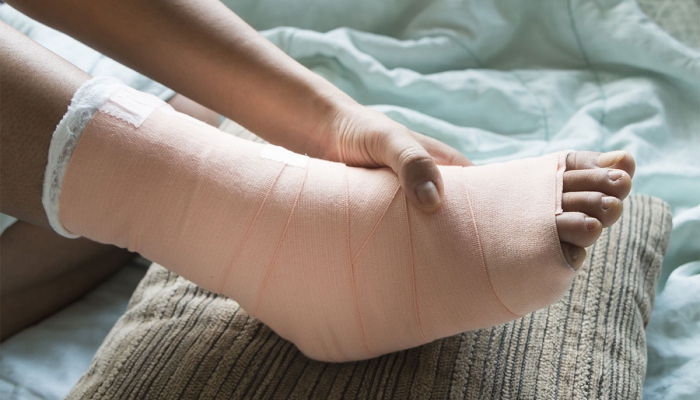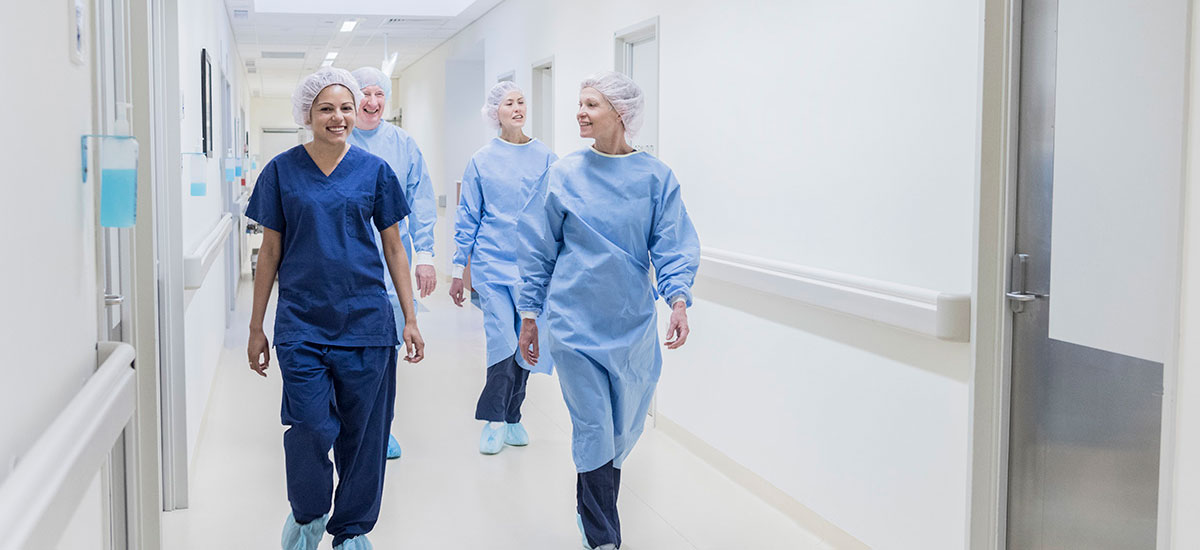Study: CABG Can Be Effective For Diabetes Patients
According to a recent study by the Karolinska Institutet, coronary artery bypass surgery may be the best treatment method for diabetes patients suffering from clogged arteries (atherosclerosis). The study was published in the Journal of the American College of Cardiology as an official consideration for patients with type 1 and type 2 diabetes, as the current international guidelines recommend the procedure for diabetes patients with artherosclerotic coronary arteries.
This is quite the revelation considering the current guidelines don’t differentiate whether this treatment option is best for type 1 diabetes, type 2 diabetes, or both. According to Martin Holzmann, a researcher at Karolinska Institutet’s Department of Medicine in Solna, “Since type 1 diabetes is a different disease with different complications, it’s never been given that the treatment should be the same as with type 2 diabetes.”
The procedure, for those who are unfamiliar, is called coronary artery bypass surgery (CABG) and it improves blood flow to the heart by connecting a healthy artery or vein from the body to the blocked coronary artery. In this process, the grafted artery bypasses the blocked artery, creating a path for healthy blood flow. This procedure is the most common open heart surgery that is performed in the U.S.
During the study, Dr. Holzmann and his research team followed up with patients with type 1 diabetes who underwent revascularization of two or more narrowed coronary vessels between the years of 1995 and 2013. The results from their data collection can be seen below:
- Patients who underwent revascularization via percutaneous coronary intervention (PCI) had a 45% increased risk of fatal heart disease.
- Patients who underwent PCI also had a 47% increased risk of myocardial infarction during the average 10-year follow-up time than patients who were treated with CABG
- Patients who underwent PCI were 5 times more likely to require further treatment.
With these results, researchers came to the conclusions that CABG was the preferred procedure for patients with type 1 diabetes and two or more diseased coronary vessels, a guideline that has been recommended for patients with type 2 diabetes. While PCI is easier to perform, researchers also found that the relative number of CAGB procedures decreased dramatically over the study period.
A direct quote from the article stated, “between 1995 and 2000, CAGB accounted for 58% of revascularizations in patients with type 1 diabetes and at least two diseased coronary vessels, a figure that was down to only 5% between 2007 and 2013.”
To learn more about this procedure and the study results, please visit Science Daily. The surgical professionals at Specialty Surgical Center specialize in a number of surgical interventions, many of which you can review on our specialties page.
Specialty Surgical Center is located in Sparta, New Jersey, and our staff consists of board certified surgeons and anesthesiologists performing procedures in Orthopedics, Sports Medicine, Spinal Care, Podiatry, Urology, Pain Management, ENT, Hand Surgery, Lithotripsy, Brachytherapy, GYN and Laser Surgery.
For more information about Specialty Surgical Center, call 973-940-3166 or visit our Contact Page.
The advice and information contained in this article are for educational purposes only and is not intended to replace or counter a physician’s advice or judgment. Please always consult your physician before taking any advice learned here or in any other educational medical material.
Allergy Testing for Ear, Nose, and Throat Conditions

Sinus infections, allergic rhinitis, and other ear, nose, and throat (ENT) conditions affect millions of Americans each year, and it’s up to the team at Specialty Surgical Center to determine what’s causing these ailments. Fortunately, our otolaryngologists have several tools and tests at their disposal to get to the bottom of our patients ENT-related issues.
For patients who suffer from chronic allergies, sinusitis, or rhinitis, allergy testing may be an appropriate diagnostic tool to discover and alleviate symptoms. Continue reading to learn more about allergy testing, what to expect during an allergy test, and what treatment options are available for patients with allergies.
What is Allergy Testing?
Allergy testing is a medical exam that determines what a patient is allergic to using blood or skin tests. Blood tests are much less common than skin tests, but they can be used to find out what may be causing a patient’s allergic reaction. Skin tests are generally preferred when investigating skin and nasal allergies because they are fast, reliable, and often less expensive than blood tests. If you develop the following symptoms frequently, you may be a candidate for allergy testing:
- Stuffy or runny nose
- Sinus pressure behind the forehead, cheeks, and eyes
- Uncontrollable sneezing
- Watery, itchy eyes
- Postnasal drip
It’s normal to experience these symptoms during certain times of the year, especially during the spring when pollen season starts and ends. However, if you’re experiencing these symptoms year-round, it’s likely you suffer from chronic allergies caused by singular or various pollutants and allergens. The team at Specialty Surgical Center will perform an allergy test to rule out and/or identify possible allergens.
What to Expect During an Allergy Test
During a skin test, a small amount of a suspected allergen is placed on or below the skin to test possible skin reactions. There are different kinds of skin tests, but the three most common include skin prick tests, intradermal tests, and skin patch tests. No matter the test, a drop of various suspected allergens are placed under the skin and monitored. Over time, the skin will either react to the allergens or not, and your otolaryngologist will be able to determine what is causing your allergies.
Treatment Options for Allergies
Based on your test results, a Specialty Surgical Center physician will determine the best course of action for treatment. Treatment may include one or several therapies, such as prescription-strength medications, nasal sprays, eye drops, and injections. Unfortunately, these treatments will not cure your allergies, but they will significantly reduce your symptoms. Talk to your Specialty Surgical Center physician about appropriate treatment options for your allergy symptoms.
Specialty Surgical Center is located in Sparta, New Jersey and our staff consists of board certified surgeons and anesthesiologists performing procedures in Orthopedics, Sports Medicine, Spinal Care, Podiatry, Urology, Pain Management, ENT, Hand Surgery, Lithotripsy, Brachytherapy, GYN and Laser Surgery.
For more information about Specialty Surgical Center, call 973-940-3166 or visit our Contact Page.
The advice and information contained in this article is for educational purposes only and is not intended to replace or counter a physician’s advice or judgment. Please always consult your physician before taking any advice learned here or in any other educational medical material.
Do Bunion Correctors and Guards Really Work?

Bunion correctors are a conservative treatment option for patients who suffer from bunions, a bony bump that forms at the base of the big toe. While the most permanent and effective form of treatment for bunions is minimally invasive surgery, there are conservative techniques patients can practice to slow the progression of the condition and/or reduce pain symptoms.
A podiatrist, which is a physician who specializes in diagnosing and treating conditions of the foot and ankle, may recommend changing your footwear, adding padding to your shoes, and taking pain relievers for discomfort. If some or all of these treatments do not provide adequate pain relief, then surgery will be advised. Still, patients usually like to exhaust all their options for care to avoid surgery, and we can understand this sentiment. Surgery is no fun for anyone.
So, patients often ask us questions about the safety and efficacy of bunion correctors and bunion guards – a type of over-the-counter orthotic that claims to correct the posture of the big toe. Other types of bunion correctors claim to relieve foot pain. Do these correctors have any merit? Our podiatrists provide their thoughts and professional opinions on these devices.
The Good
Bunion correctors and guards do have a place in the treatment of bunions, but it may not be what you think. Unfortunately, there is no medical research or data to support the claim that bunion correctors straighten the big toe. If your bunions are pretty severe, no plastic or elastic device is going to correct them. However, these correctors and splints may provide some pain relief to the big toe. They separate the big toe from the surrounding toes, which can help loosen the big toe’s tight muscles. This is about the extent of the a bunion corrector or guard.
The Bad
As we alluded to previously, there is no medical data to support the benefits of bunion correctors. They may offer pain relief and protection for the upper foot, but that’s about it. Ultimately, if your bunions are causing you a great deal of discomfort, it would be best for you to see a podiatrist at Specialty Surgical Center. Our team can walk you through the surgery and what to expect during the recovery phase. If you have any questions or concerns, call Specialty Surgical Center to schedule an appointment with a podiatrist today!
Specialty Surgical Center is located in Sparta, New Jersey and our staff consists of board certified surgeons and anesthesiologists performing procedures in Orthopedics, Sports Medicine, Spinal Care, Podiatry, Urology, Pain Management, ENT, Hand Surgery, Lithotripsy, Brachytherapy, GYN and Laser Surgery.
For more information about Specialty Surgical Center, call 973-940-3166 or visit our Contact Page.
The advice and information contained in this article is for educational purposes only and is not intended to replace or counter a physician’s advice or judgment. Please always consult your physician before taking any advice learned here or in any other educational medical material.
What To Expect During A Fasciotomy

If your Specialty Surgical Center physician is suggesting you receive a fasciotomy, chances are you suffer from plantar fasciitis; a condition that causes inflammation of the fascia on the bottom of the foot. Plantar fasciitis is a very common condition, affecting more than three million people in the U.S. each year. Symptoms of this ailment typically include the following:
- Sharp, stabbing heel pain
- Tenderness and swelling near the heel and sole of the foot
- Sharp pain that is often worse in the morning
- Change in gait due to pain symptoms
If you suffer from any of these symptoms, you should notify your SSC physician right away. Typically, the first line of treatment for patients who suffer from this condition includes over-the-counter pain medications, rest, ice, elevation, and physical therapy. As the condition worsens, patients may require steroid injections or surgery to correct the problem. If you are scheduled for a fasciotomy, here’s what you can expect during the procedure:
Your SSC physician will administer general or regional anesthesia before making an incision in the affected limb. Normally, two longitudinal incisions are made along the affected leg to expose the fascia that needs to be excised. Your physician will make the necessary cuts to the fascia using special surgical scissors to ensure pressure on nearby ligaments has been relieved.
A two-incision approach is currently the recommended technique because it’s safe and more effective than a one-incision approach. This surgical procedure may also be performed on the upper extremities to release pressure from damaged hand and wrist fascia. After the procedure, the physician will close the incisions and send the patient to a separate room to recover.
Once the patient’s vitals are normal and he or she has demonstrated no signs of an adverse reaction, the patient will be sent home to resume post-surgical recovery. As we alluded to previously, this procedure can be performed on the legs, feet, arms, and hands – anywhere there is a tight fascia muscle causing discomfort and pain.
For more information about this procedure, please call Specialty Surgical Center today to speak with a representative. We would be happy to schedule a consultation with one of our physicians.
Specialty Surgical Center is located in Sparta, New Jersey and our staff consists of board certified surgeons and anesthesiologists performing procedures in Orthopedics, Sports Medicine, Spinal Care, Podiatry, Urology, Pain Management, ENT, Hand Surgery, Lithotripsy, Brachytherapy, GYN and Laser Surgery.
For more information about Specialty Surgical Center, call 973-940-3166 or visit our Contact Page.
The advice and information contained in this article is for educational purposes only and is not intended to replace or counter a physician’s advice or judgment. Please always consult your physician before taking any advice learned here or in any other educational medical material.
Schedule Your Surgical Procedures Before the End of the Year!

The holiday season is upon us, and while you may be ready to spend time with family and ring in the New Year, try not to say goodbye to 2017 too quickly. Why? Because you’ve got your health to think about! That’s right, it’s time to schedule medical procedures and lab tests before the end of this year. Doing so will not only benefit you financially, but it’ll give you peace of mind!
We know what you’re thinking – it’s the end of the year and you already have a million and one things to do. Yes, it’s true – your time is limited during the holiday season. Nevertheless, it’s imperative you make your health a priority because there are certain advantages to scheduling your medical procedure before the end of the year. In this blog, we’ll outline some of the key advantages:
Meet Your Annual Deductible
If you’re close to meeting your annual deductible or you’ve already met it, there are huge cost-savings to scheduling some of your much-needed appointments now! Before your deductible resets to zero, consider scheduling the following procedures or appointments: colonoscopy, diagnostic testing, primary care appointment for prescription refills, outpatient surgery, and blood or lab work.
FSA: Use It or Lose It
Do you have a Flexible Spending Account (FSA) through your employer? If you do, remember that the funds from this account typically do not roll over year-to-year, so if you don’t use it, you’ll lose it! Check with your insurance provider to see what’s left of your funds so you can put your FSA to good use.
Receive Peace of Mind
In addition to some of the health insurance benefits you will receive by scheduling your procedure before the end of the year, you will also experience total peace of mind. What do we mean by this? Well, there’s nothing better than entering the New Year as a better, healthier version of yourself. At Specialty Surgical Center, we aim to provide patients with complete confidence in their care and well-being. When you feel good, you live even better, and it’s our mission to make your health the best its ever been.
If you need to schedule a procedure with our team, call the phone number listed below or visit our contact page. Once you fill out the form, an SSC representative will be with you shortly!
Specialty Surgical Center is located in Sparta, New Jersey, and our staff consists of board certified surgeons and anesthesiologists performing procedures in Orthopedics, Sports Medicine, Spinal Care, Podiatry, Urology, Pain Management, ENT, Hand Surgery, Lithotripsy, Brachytherapy, GYN and Laser Surgery.
For more information about Specialty Surgical Center, call 973-940-3166 or visit our Contact Page.
The advice and information contained in this article are for educational purposes only and is not intended to replace or counter a physician’s advice or judgment. Please always consult your physician before taking any advice learned here or in any other educational medical material.
Your Game Plan for Recovering from ACL Surgery

It’s no fun being sidelined by an anterior cruciate ligament (ACL) injury. But a realistic understanding of what recovery entails can help you prepare for the process of getting back to the activities you love.
Here’s an overview of what to expect during recovery:
Prehab: Your doctor may suggest you start physical therapy even before surgery to strengthen the muscles that support your ACL. At least one study suggests that going into surgery with that baseline of strength can improve outcomes.
0 to 2 weeks. You’ll go home the same day as your surgery, but don’t plan on doing much. Ideally, you’ll have someone at home to help you out for the first few days.
You will have to stay off the affected leg, so you’ll be walking on crutches. You will need to prop your leg frequently to reduce swelling. Plan on using lots of ice.
Also, be sure to keep your bandages and the incision site clean to prevent infection.
Your rehab will start immediately, with exercises to prevent blood clots and straighten your knee so that you maintain full range of motion in the future.
Expect to be off work for a few days, or possibly longer, depending on how physically demanding your job is.
If you’re doing well, you may be able to start putting weight on the affected leg a week or two after the surgery.
2 to 6 weeks: Although recovery times vary from person to person, around this time, you should be off crutches and be strong enough to drive. You may be fitted with a brace. You’ll start working with a physical therapist if you haven’t already.
The therapist will work with you on activities to regain strength and range of motion. You’re likely to be using light weights or sport cords and working out on a stationary bike. Follow your therapist’s instructions carefully. Doing either too much or too little can jeopardize your recovery.
6 weeks to 3 months. You will continue physical therapy, and at this point, you’ll probably be able to take part in low-impact sports like rowing, swimming, and cycling.
3 to 6 months. The end is in sight. You may be able to start light jogging at this point. You’ll continue working with the physical therapist to strengthen the muscles supporting your knee. He or she will also teach you exercises that you should continue indefinitely to avoid another injury.
6 months on. If your rehab has gone well, you will be able to return to your previous level of activity. Your doctor may want you to continue wearing a brace for a few more months.
With a combination of patience and hard work, you should emerge from ACL surgery strong and ready to take on the world!
For more information about this procedure, please call Specialty Surgical Center today to speak with a representative. We would be happy to schedule a consultation with one of our physicians.
Specialty Surgical Center is located in Sparta, New Jersey, and our staff consists of board certified- surgeons and anesthesiologists performing procedures in Orthopedics, Sports Medicine, Spinal Care, Podiatry, Urology, Pain Management, ENT, Hand Surgery, Lithotripsy, Brachytherapy, GYN and Laser Surgery.
For more information about Specialty Surgical Center, call 973-940-3166 or visit our Contact Page.
The information contained in this article is for educational purposes only and is not intended to replace or counter a physician’s advice or judgment. Please always consult your physician before taking any advice learned here or in any other educational medical material.
Do you need shoulder surgery for a rotator cuff injury?

A rotator cuff injury is a tear in the group of four muscles that cover the “ball and socket” joint of the shoulder.
A tear can occur suddenly and obviously, for instance during an athletic event. Or it can develop gradually over time. Some rotator cuff tears come about from normal age-related wear and tear, and the patient won’t be able to recall anything that caused the tear.
Your doctor may use a magnetic resonance imaging (MRI) scan or ultrasound to better understand what is going on in your shoulder. Whether you’ll need surgery depends on your level of pain and whether other, less-invasive treatments can help you.
Your doctor will probably first see if physical therapy, steroid injections, and/or nonsteroidal anti-inflammatory medications can take care of the pain.
Surgery may be needed if:
- Pain and weakness in your shoulder continue despite several months of rest and medication.
- The pain keeps you awake at night.
- You have trouble lifting or reaching with the arm.
Your doctor may recommend going straight to surgery, though, if you use your arm for overhead work or sports, or if the tear is quite large.
If you do need surgery, it will probably be performed using a minimally invasive technique called arthroscopy. This means a thin fiber-optic camera called an arthroscope, along with surgical instruments, will be inserted into small incisions in the shoulder.
You should be able to go home the same day as your surgery. You’ll need help at home, though, because you’ll need to have that arm in a sling for probably four to six weeks. You’ll be in physical therapy for a few months, although you may be able to return to many of your normal activities within six to eight weeks.
Within three to four months, you’ll probably be able to participate in limited athletic pursuits. If all goes well, you could return to all your activities in four to six months.
If you’re concerned about shoulder pain, one of the doctors at Specialty Surgical Center can help diagnose the problem and talk to you about options.
Specialty Surgical Center is located in Sparta, New Jersey, and our staff consists of board certified surgeons and anesthesiologists performing procedures in orthopedics, sports medicine, spinal care, podiatry, urology, pain management, ENT, hand surgery, lithotripsy, brachytherapy, GYN, and laser surgery.
For more information about Specialty Surgical Center, call 973-940-3166 or visit our Contact Page.
The information contained in this article is for educational purposes only and is not intended to replace or counter a physician’s advice or judgment. Please always consult your physician before taking any advice learned here or in any other educational medical material.
FAQs about Minimally Invasive Hysterectomy

Your doctor may recommend a hysterectomy for any number of conditions, ranging from uterine fibroid growths to endometriosis to cancer, that haven’t responded to other treatments.
You probably have many questions about what to expect, so we’ve put together a list of FAQs for our patients who will be having a minimally invasive hysterectomy.
Q. How long will it take to recover?
A. Fortunately, with minimally invasive surgical techniques, the recovery is shorter—usually two weeks or less—compared with the more traditional open abdominal surgery, which requires a hospital stay and six weeks of recovery.
After surgery, we encourage you to get up and move around right away, and you can probably return to work within a week or two if your job isn’t physically demanding. You can start exercising again within a few weeks.
Q. Will I be able to get pregnant?
A. Because a hysterectomy removes the uterus, which holds the fetus until birth, you will not be able to give birth after a hysterectomy. If you hope to have children, there may be other options short of a hysterectomy to deal with your symptoms.
Q. Will I still have periods after a hysterectomy?
A. No, that’s the good news! Menstrual periods happen when the lining of the uterus is shed each month, so you will not have periods once your uterus has been removed.
Q. Will I go through menopause?
A. That depends on the type of surgery you had. Some women have their ovaries removed at the same time they have a hysterectomy. If that’s the case, they go into menopause immediately. If they don’t have their ovaries removed, they will continue to produce estrogen. However, even if they still have their ovaries, women who’ve had hysterectomies do tend to go into menopause a little earlier than those who haven’t had the surgery.
Q. Will I enjoy sex after a hysterectomy?
A. You will need to avoid having sex for a few weeks after your operation, but once you have recovered, you should be fine. If you enjoyed sex before, chances are you will enjoy it afterward. In fact, some women find they are more interested in sex once the painful condition that led to hysterectomy is taken care of.
However, if you were premenopausal and had your ovaries removed, you will go into menopause, and that may affect your sex life. Some women find their desire flagging during menopause because levels of the hormone estrogen drop. If that happens to you, your gynecologist can help you find ways to manage that and other issues related to menopause.
For more information about hysterectomy or other surgical procedures, please contact Specialty Surgical Center. We would be happy to schedule a consultation with one of our physicians. You can call 973-940-3166 or visit our Contact Page. Once you fill out the contact form, an SSC representative will be with you shortly.
Specialty Surgical Center is located in Sparta, New Jersey, and our staff consists of board-certified surgeons and anesthesiologists performing procedures in orthopedics, sports medicine, spinal care, podiatry, urology, pain management, ENT, hand surgery, lithotripsy, brachytherapy, gynecology, and laser surgery.
The information contained in this article is for educational purposes only and is not intended to replace or counter a physician’s advice or judgment. Please always consult your physician before taking any advice learned here or in any other educational medical material.
Does My Child Need a Tonsillectomy?

If your child suffers from frequent sore throats, you may wonder if they should have their tonsils removed. The answer is: it depends.
The tonsils are twin oval-shaped lumps of tissue in the throat that produce disease-fighting white blood cells. Removing the tonsils, called a tonsillectomy, is a relatively common procedure. About 530,000 children under 15 have it done each year.
But like any surgery, tonsillectomy carries some risks, and the recovery is painful. Guidelinesfrom American Academy of Otolaryngology-Head and Neck Surgery recommend the surgery be performed on children only in limited circumstances:
- The tonsils are so enlarged they are causing sleep apnea, a condition where the airway becomes blocked during sleep. This hampers breathing and disrupts the child’s sleep. Children with sleep apnea may have problems with slow growth, hyperactive behavior, poor school performance, and bedwetting.
- The child has frequent throat infections. Frequent is defined as at least seven infections in one year, at least five infections per year over two years, or at least three infections per year over three years.
- The child has a bacterial infection that doesn’t respond to antibiotics, or the child develops an abscess behind a tonsil that can’t be treated with drugs or a drainage procedure.
A tonsillectomy may also be needed to treat certain rare diseases, such as cancer in the tonsils or recurrent bleeding near the surface of the tonsils.
If your child does need a tonsillectomy, it will usually be done as an outpatient procedure under general anesthesia. Recovery can be painful and will probably take 10 days to two weeks. You’ll need to make sure your child takes pain medications your doctors recommends and drinks plenty of fluids.
The one consolation for the pain: Your child will have a good excuse to eat ice cream, milkshakes, and popsicles.
If you’re wondering if your child needs tonsil surgery, contact us for an evaluation.
Specialty Surgical Center is located in Sparta, New Jersey, and our staff consists of board certified surgeons and anesthesiologists performing procedures in orthopedics, sports medicine, spinal care, podiatry, urology, pain management, ENT, hand surgery, lithotripsy, brachytherapy, GYN, and laser surgery.
For more information about Specialty Surgical Center, call 973-940-3166 or visit our Contact Page.
The information contained in this article is for educational purposes only and is not intended to replace or counter a physician’s advice or judgment. Please always consult your physician before taking any advice learned here or in any other educational medical material.
Is it time for a knee replacement?

Knee replacement is one of the most common surgeries in the U.S.—doctors perform more than 600,000 operations per year.
Also called knee arthroplasty, knee replacement surgery is generally considered safe and effective. It can relieve pain for people whose arthritis has caused serious knee deterioration and can allow them to become more active again.
Any surgery, though, comes with risks and requires a period of recovery and rehabilitation, so it’s wise to carefully weigh the pros and cons. Here are five questions to ask when deciding whether to have a knee replacement.
1. How much pain are you in, and how much is your knee problem limiting your daily activities? If you have severe pain and have trouble walking, climbing stairs, or getting in and out a chair, it may be time to consider knee replacement. Knee surgery recovery itself is painful, though, so if your pain is more moderate, other options may be the best choice.
2. Can other less-invasive options relieve the pain? Medication, physical therapy, acupuncture, and procedures such as steroid or hyaluronic acid injections provide relief for some people. Less-invasive types of surgery may also help in some cases. If you’ve already tried these alternatives, and they aren’t working, surgery may be the best choice.
3. Are you healthy enough to handle the surgery? Your doctor may hesitate to operate if you have other serious medical conditions, such as heart or lung disease, that make complications more likely. Extreme obesity and previous infections in the knees or hips may also lower your chances for a successful operation and recovery. Your doctor will take all these factors into consideration on a case-by-case basis in deciding whether it makes sense to go ahead with a knee replacement.
4. Do you have realistic expectations? You won’t be running a marathon after knee replacement. That much pavement pounding would damage the artificial joint, so running, tennis, and other high-impact activities will be off-limits for the rest of your life. There are lots of things you will be able to do, though, as long as the rest of your health is OK—you can go on long walks, golf, dance, cycle, and swim, for instance.
You also need to be realistic about the recovery process. You’ll need to endure several weeks of recovery and faithfully perform the physical therapy your doctor recommends to get the best results.
5. What are the pros and cons of waiting? Most replacement knees last at least 15 years, but if you live long enough, the artificial joint will probably eventually wear out. You can get a second replacement, called a “revision” surgery.
The success rate the second time around, while good, is not quite as high as with first-time knee replacements, so if you’re relatively young and your pain is not severe, you may want to hold off. That said, sometimes knee replacement is the best option even for younger people.
There can also be drawbacks to waiting. You may not want to wait if your knee problems are causing issues in other parts of your body—for instance, if your knee pain or deformity is causing you to move in such a way that causes back or hip pain. Also, if knee pain is keeping you so sedentary that the muscles around your joints are becoming weak and your bones are becoming thin, it may be better to operate sooner rather than later.
If you’re wondering if knee replacement is right for you, feel free to contact one of our orthopedic specialists for an evaluation.
Specialty Surgical Center is located in Sparta, New Jersey, and our staff consists of board-certified surgeons and anesthesiologists performing procedures in orthopedics, sports medicine, spinal care, podiatry, urology, pain management, ENT, hand surgery, lithotripsy, brachytherapy, GYN, and laser surgery.
Specialty Surgical Center is located in Sparta, New Jersey, and our staff consists of board certified surgeons and anesthesiologists performing procedures in orthopedics, sports medicine, spinal care, podiatry, urology, pain management, ENT, hand surgery, lithotripsy, brachytherapy, GYN, and laser surgery.
For more information about Specialty Surgical Center, call 973-940-3166 or visit our Contact Page.
The information contained in this article is for educational purposes only and is not intended to replace or counter a physician’s advice or judgment. Please always consult your physician before taking any advice learned here or in any other educational medical material.
Some of the links on this page will take you away from
this site to another website, which may be a non-WCAG compliant website. SCA may not control the
content or links of non-SCA websites.









